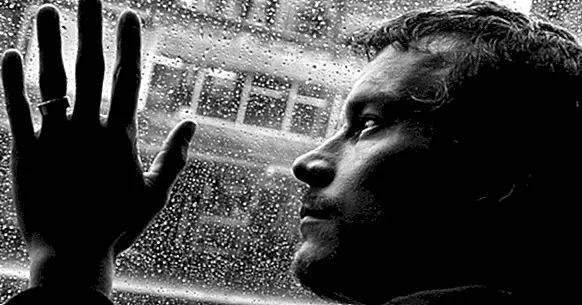3 surprising effects of depression
The depression is, perhaps, the most recognized psychopathology and with higher prevalence rates, together with others such as anxiety-related disorders.
It is estimated that, only in the Kingdom of Spain, a 25% of the population suffer from a depressive disorder , and a fifth of these people suffer a serious disorder.
It may interest you: "Types of depression"Discovering the curious effects of depression
However, beyond the lack of hope, sadness, lack of energy and asthenia, the consequences of depression also develop in other areas causing really curious changes in our personality and in our cognition.
1. Depression compresses the size of the brain
An investigation carried out by scientists from Yale University found that depression can lead to a reduction in brain volume , because the neurons of some regions are of a smaller size and lose density. Consequently, neural connections are altered. To reach this conclusion, we studied the brain tissue of people with and without depression, in a comparative way.
It seems that this effect is due to the GATA1 , a protein that contributes to the regulation of the transcription of genetic material and that is activated in the brain of people affected by a depressive disorder.
GATA1 inhibits the expression of some of the genotypes involved in the construction of synaptic connections, affecting the dimensions and complexity of dendrites, basic agents for the synapse to occur. This loss of volume not only causes alterations in the affectivity and the cognitive capacity of the subject, but also causes a decrease in the mass of the prefrontal cortex, whose function is to facilitate decision-making, control over impulses and management emotional.
2. Depression obfuscates memories
A study conducted at Brigham Young University revealed that Depressive disorders cause the effect of blurring memories . For years now, depression has been linked to a defective memory , but the mechanism that caused this phenomenon was unknown.
The study recruited subjects diagnosed with depressive symptoms, and others without psychopathological symptoms. The subjects were exposed to a series of objects that appeared on a screen. Later, the same objects were presented to them, and they had to indicate if they had seen them before, if some object resembled one seen before, or if it was a new object unrelated to those previously seen.
After studying the results, the students noticed that the subjects with depression had a greater tendency to confuse some objects, signaling them as similar to others that had appeared before. This suggests that depression does not cause amnesia but a decrease in the precision of the details. You could say that people with depression have a less skilful memory, blurred, and therefore can not remember some details.
3. Depression sharpens the perception of time
Although depression is always perceived as purely negative, this third point points to a small psychophysiological advantage. An investigation carried out at the University of Hertfordshire found that depressed people enjoy a more accurate temporal perception than non-depressed people .
The research recruited subjects with moderate depression, and others without diagnosis of disorder. Both groups had to listen to five tones whose duration oscillated between 5 and 60 seconds, and right after they were commanded to remember a number (it was a disruptive task), and then they were asked to emit an approximation as concrete as possible. the duration of each tune.
It was surprising to see that, almost without exception, people without depression estimated the time of the tones exceeding the real time, while, on the other hand, people with depression had a much better time.
The reason for this could be found in a controversial concept, called "depressive realism". Depressive realism holds that people with depression are not affected by positive and optimistic expectations that do alter the perception of reality in people who do not suffer from depression.



















